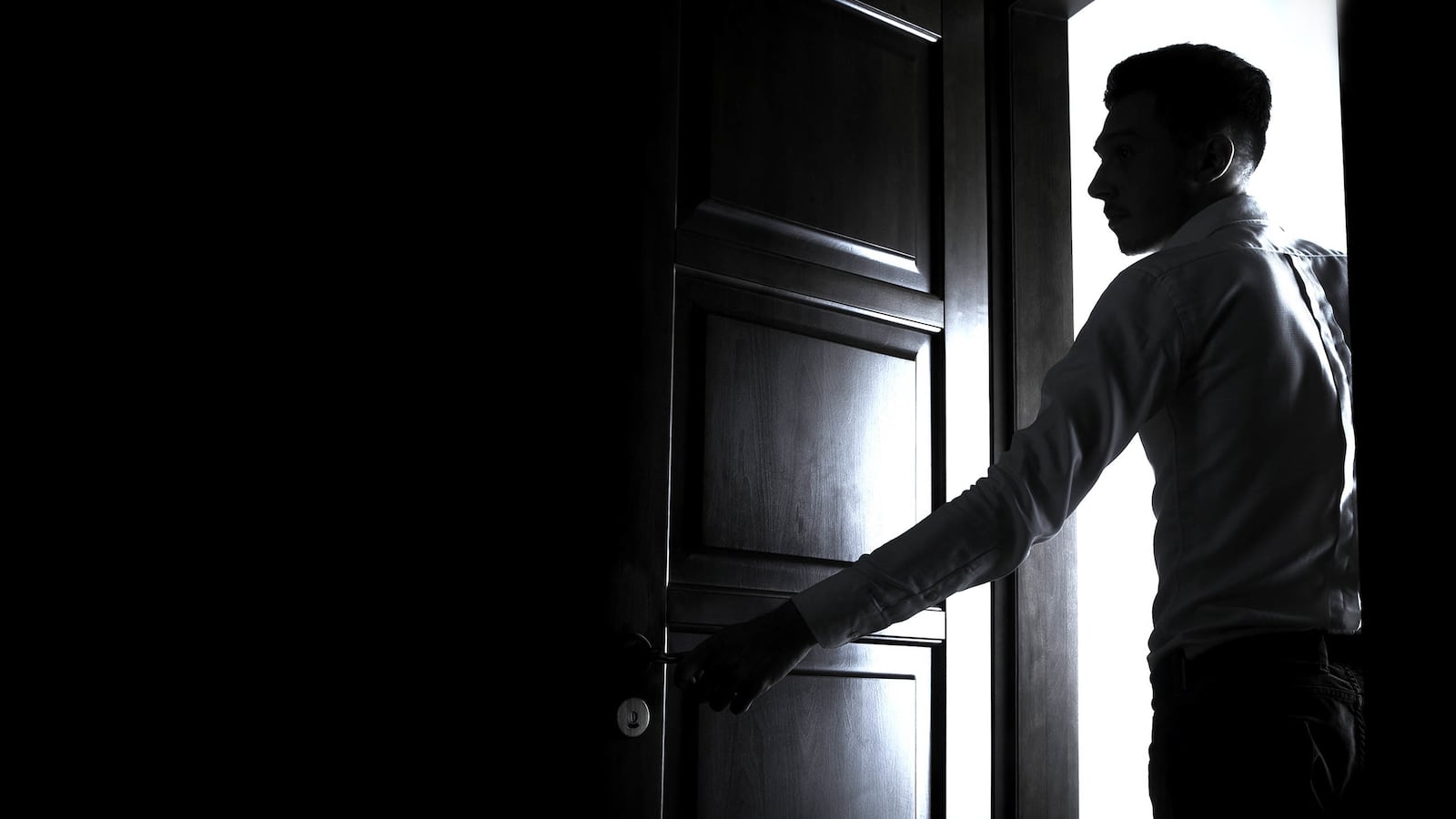Rockville, Md., parents John and Janice Land were recently charged with abuse and false imprisonment of their 22-year-old autistic non-verbal twin sons. A police SWAT team entered the home on an unrelated marijuana charge and discovered the twins padlocked in a basement room that stank of urine. There was no furniture in the room—just a comforter on the floor—and only one tiny window. There were no smoke detectors in the home. It would have been impossible for the twins to escape in case of a fire, and very difficult for firefighters to reach them.
The twins have since been placed in another home, and a medical examination revealed no further signs of abuse. Lucille Baur, public information officer for the Montgomery County Police, tells The Daily Beast that, contrary to some claims in the media, neither the Rockville City Police nor the Montgomery County Special Victims Investigation Division received any calls from neighbors reporting the abuse.
It is not fair to John and Janice Land to find them guilty as charged by media. They are entitled to mount a defense in court. But neither does it seem fair to their sons to prematurely exonerate John and Janice Land, and assume that they did what they did simply because they lacked services. I’ll leave judgment of the Lands to a jury.
The Land case, however, raises what can be a touchy subject for those who are caregivers (including me) of people with cognitive disabilities. Sometimes the care given to people with disabilities is quite different from the care given to typically developing children. Let me emphatically state that what the Lands are alleged to have done is not the norm. But, for example, the practice of caregivers locking children and adults with cognitive disabilities in rooms or beds at night is far from unheard of. Some caregivers, then, are afraid that their well-intended care may be mistaken for abuse.
Caregivers are, or at least should be, aware that people with disabilities suffer abuse at a much higher rate than typically developing children. Ari Ne’eman, president of the Autistic Self-Advocacy Network, points out to The Daily Beast that there is an overarching media narrative that caregiver abuse (or even murder) of people with developmental disabilities is understandable or even excusable (see, for example, here), and that his group believes that such news stories lead to copycat cases of abuse.
I think—I hope—that most caregivers would never try to explain away caregiver abuse and murder, and furthermore, that they wish to ensure that suspected cases of abuse are investigated and prosecuted to the fullest extent of the law. As in any other area of law, though, such a belief is not inconsistent with a belief that people may be unjustly accused. The very same lack of legal clarity regarding what constitutes appropriate treatment of people with cognitive disabilities that allows too much wiggle room for abusers might also possibly catch doting parents.
While not practiced by all caregivers, preventing people with cognitive disabilities from wandering at night is common enough that there are products that serve the purpose. (For example, see here and here.) Full disclosure: My 4-year-old non-verbal son uses the latter product. Another disclosure: It was very hard for me to write the preceding sentence precisely because I am afraid that my intentions may be misconstrued.
Many of the news articles about the Land case emphasized that the sons could not escape if there were a fire. Neither, presumably, could the people whose caregivers use these products. It seems possible, then, that at least the false imprisonment charges—not the abuse charges—that the Lands face might apply to many parents who sincerely believe they are acting in their children’s best interests when they lock their doors or zip their tents at night.
Those of us who are caregivers to typically developing children (I also have two typical sons) sometimes disregard our children’s desires. I decide much of what my young kids can and cannot eat, what TV they can and cannot watch. I have restrained them while they squirmed in my lap, trying to escape, so they can receive medical treatments—most recently, for a test for strep throat. I sometimes insist that they stay inside the house or the car despite their desire to leave—for example, if they will run into traffic. Obviously, if I told my husband what he could eat and when he could leave the house, it would be a criminal violation of his autonomy and dignity. If I had adult typical children, I would also be violating their autonomy. With young children, on the other hand, it’s an abnegation of my duties not to override some of their impulses so that I can act in their best interests.
When parenting typical children, we all understand that at some point or another, we place more and more autonomy in our children’s hands. There are debates about when and how this should happen—advocates for free-range kids argue with advocates of safe spaces for children—but we all know that it is probably inappropriate to ask a 13-year-old if she’s sure she finished wiping after a potty visit.
The point at which autonomy should be handed over to the child is less clear when parenting children with cognitive disabilities. It is one thing to insist a 2-year-old submit to a diaper change even if she is unwilling. What about when the person is 5? 7? 15? 22? Caregivers are often on their own in figuring out that fine line between granting appropriate autonomy and ensuring safety so that the highest degree of autonomy may eventually be achieved.
“Having a 15-month-old in a 6-year-old (or 22-year-old) body poses many dangers most people never have to consider,” a Texas mother of a 6-year-old boy with limited communication skills and behavioral challenges says in a text message. Her son’s room is unlocked but he sleeps in the same kind of tent my son does. His tent is the only place in which his parents feel they can ever leave him unsupervised for a moment. Their house has a catwalk at the top of the stairs and while she has concerns about fire safety, she is more worried about the safety of her child when he wanders. “I have nightmares about him throwing his body over the railings on the catwalk,” she said.
I imagine that other parents of children with special needs have fantasies, as I do, of a spacious comfortable ranch house with high fenced yards near no busy roads or bodies of water. Obviously, such houses are not always available or affordable.
Taimie Hoffman, mother of a non-verbal 11-year-old named Alexa, tells me emphatically that she would never use padlocks on her child’s door (as did every other caregiver I spoke to). She has, however, reversed the doorknob of Alexa’s room so that it locks from the outside. Before Hoffman took this step, Alexa would roam their house at night, waking her parents and siblings, rummaging through the fridge. She occasionally got hurt. Since switching the doorknobs, Hoffman says, Alexa and everyone else in the household sleeps better. “If we have a fire, she wouldn’t know to go outside,” pointed out Hoffman, who also noted that because Alexa’s door is locked, her daughter would be more easily found in case of fire. “I don’t want to find out what could happen if we didn’t have the doorknob switched.”
It is especially sad that the Land twins suffered their conditions in Montgomery County. Not every police force has a liaison devoted to dealing with people with cognitive disabilities and their caregivers, and Laurie Reyes, coordinator of the county’s Project Lifesaver, is an enthusiastic and passionate advocate for connections between people with cognitive disabilities and law enforcement.
I asked Reyes what caregivers should do rather than locking their children in a room at night, and she had several helpful suggestions. Parents can install an alarm on their outside door—although that, of course, costs money. People with cognitive disabilities can wear an ID bracelet or a T-shirt that says, “I have autism; call 911 if I am alone.” (She points out that this is not required and no one should feel branded.) She suggests distributing a letter to neighbors describing the person so that they may be on alert. One of her guides to caregivers stresses the importance of not being afraid to call 911 if their child is missing. Presumably some are afraid to call 911 because they are afraid of being charged with neglect.
Ne’eman, on the other hand, suggests that instead of setting up a system of alarms to detect elopement and locking children in, parents address the reasons that autistic people might wander. There may be something about the current situation that an autistic person is trying to escape, and locking her in does not address the problem. Locking her in not only puts her at greater risk, but it deprives her of the opportunity to learn how to handle herself.
Either one of these approaches may address the concerns of caregivers whose children leave the house. Both the mothers I interviewed, however, are, like me, more concerned about dangers their children face while actually in the house. Our children wander not because they are unhappy in their home, but because they want to play with their toys and explore and climb. They want to do all the things they should do to learn how to handle themselves and the world, but that require supervision. Infants and young toddlers are placed in cribs to keep them from roaming; is placing a child in a tent not similar?
Several parents I spoke to analogized locking their children in to placing a young child in a crib. Ne’eman rejects the analogy, and notes that people also analogize using restraints on people with cognitive disabilities to seatbelts. It’s the difference, he says, “between willfully preventing someone from being where they want to be, versus helping someone be where they want to be.” Cribs, unlike seatbelts, are built for the purpose of willful prevention. He stresses that people with disabilities are often locked in rooms and forgotten, whereas in the case of infants in cribs, parents leave the door open or a monitor on, sleep nearby, and protect the infant in other ways.
Both mothers I spoke to insisted that they ensure the environment is comfortable for their children, and that they can hear if there’s an emergency. In my son’s case, he has several favorite stuffed animals in his tent. He has never once objected to being placed inside. He shares his room with one of his brothers who can unzip the tent, and I sometimes find them playing or sleeping together in the tent in the morning. Their room is directly below mine and I can hear all too well everything that the two of them are up to. Do I think this is an ideal solution? No. Do I have qualms about it? Definitely. Can I think of anything better at this point? If I could, I’d be doing it.
I asked Reyes what she could say to parents who are afraid that they may be accused of abuse. She said that parents should communicate with law enforcement, and that law enforcement can distinguish between good intentions and bad. I have to admit this answer was not entirely reassuring, but for now it seems the best we can do.






